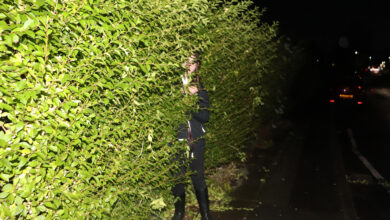
Reframing Liverpool and Scousers: How Jade Franks Is Challenging the Narrative
Whilst it’s to be celebrated that the fierce colours of Liverpool are finally being appreciated in the media, can it always be true that any publicity is good publicity? Are we repeatedly selling out negative stereotypes surrounding crime and violence, without seeing the larger issue of socioeconomic disparity and classism that fester within them?
This question feels particularly relevant in light of the city’s recent time in the spotlight, recently releasing shows such as This City Is Ours, The Responder, The Gathering, The Cage and even Black Mirror’s “Plaything” episode (complete with a token Scouse drug dealer despite having nothing else to do with Liverpool). What do all these dramas have in common? Violence. Crime. Drugs.
Though these narratives have grounding in real issues which do exist within the city, this repetitive stereotype is not only, dare I say, easy; it seems to favour the drama rather than having the aim of any enlightening, new, or slightly nuanced perspective.
The most disappointing part for anyone who loves their city and television equally is the tactless portrayal of socioeconomic scars left by Thatcherism and the city’s managed decline.
It’s here that playwright and actor Jade Franks offers something refreshingly different. Her onewoman play Eat The Rich (But Maybe Not Me Mates x) burst out of the Edinburgh Fringe, winning the Scotsman Fringe First Award, Holden Street Theatre Award, and the Filipa Bragança Award.
The show is now coming to Soho Theatre on 12-31 January 2026 for a limited 3 week run. (Tickets now available via Soho Theatre’s website or there are links on the play’s social media account @eattherichplay).
Jade undermines and satirises the UK’s pecking order with wit as pointed and colourful as her acrylics. What’s more fitting than to point the finger at classism than with a new set?
Drawing on her time at Cambridge, Jade’s Eat the Rich turns the absurdity of class and elitism into comedy gold. “I’d say probably 90% of the stories in the play are true,” she says. The show follows a working-class student hiding her job as a cleaner, learning to survive in a world that won’t bend for her. A sharp look at ambition, identity, and the myth of meritocracy.

“Ultimately, it’s not me that should change, and it’s not people who are like me that should change, it’s the system, and it’s the people who need to rethink the stereotypes that they’ve been brought up with,” Jade explains.
When asked if anything about how the play was received had shocked her, she highlighted the emotional response of the older generation that surprised her most. “The people who were my parents’ age and have got kids who are now middle class, the kids I went to uni with. Their emotional reactions of going back, like, 30 years to their experience and it not being any different from what I went through. That was surprising, in a way. It just shows that things haven’t really changed.”
It’s perhaps unsurprising that the most emotional responses to Eat the Rich came from older audience members. Having lived through Liverpool’s managed decline (the closure of industries, economic hardship, and the long-lasting stigma it created), this generation knows firsthand the challenges that still shape the city today. Jade’s play, while told through the eyes of a young woman, echoes those persistent struggles, showing how classism and social barriers continue to haunt Liverpool’s reputation.
It’s important to point out the complexity here. While many contemporary shows perpetuate stereotypes about Liverpool, they also open doors for northern working-class actors to land roles, something that Jade knows firsthand.
“I was in a London theatre for the first time with all the people on my course at Cambridge […]. And then the fella walks out [after the show] and he’s got an accent like mine. It was just so special.”
“There wasn’t that many from state schools, from working my background in the theatre scene,” she recalls.
The talent of these individuals portraying such difficult roles shouldn’t be overlooked; something that Liverpool is nothing but proud of, showing the talent born here. However, while these shows create opportunities, they also reinforce limiting stereotypes. Jade describes how she found herself typecast early on, often being offered only certain roles based on her accent or background, which narrowed the scope of what she could play:
“I always felt like I was like a box of like when I was casting things it was like a small or I would be told to bump my accent for the role. It wasn’t a fair assessment of what I was capable of as an actor.”
And despite this show being a testament to Jade’s wit and creative abilities in the comedy sector, she detailed how it was not 100% her choice to delve into comedy: “I kind of end up through the comedy at uni because I wasn’t any roles in the in the more serious plays […] I wanted to be taken seriously but then I got to Cambridge and I didn’t feel like that was the case.”
Jade decided to then use this stereotyping to her advantage, saying: “Alright, I’ll do comedy then. Because if people are laughing at me anyway, I may as well have some autonomy over what people laugh at and I can represent where I’m from in the way I want, without having people put judgements onto me.”
She recalled the “amount of auditions [she’d] done for roles like ‘Scouse pregnant teen’ or ‘drug dealer’s girlfriend’ is too real” and how this is also transferrable between most working-class cities: “I’d get roles for like Essex girl’s […] as though the working-class experience was interchangeable.”
She says underpinning the lack of substance and account of individual experiences (and also the very grounding of what it means to stereotype without basis) is expressed. It is that narrow-minded stereotyping which limits both actors and the media image of working class cities.
Jade has a background in outreach education and theatre, not English as the play may suggest; it is this background which has influenced her art:
“I am always thinking, how do we create a space for people from working-class backgrounds in places that don’t often feel like they’re built for them? theatre is it one of them and so is university.”
Her words highlight a wider issue: the institutions that shape culture and opportunity (from education to the arts) are often inaccessible by design, leaving stereotypes unchallenged and voices like hers underrepresented.
It’s art like Eat The Rich (But Maybe Not Me Mates x) that is not only excellent, but essential for diversifying the way Liverpool is portrayed in media. So my point is, we need all of these different stories because they articulate the nuances and different experiences we are all trying to navigate. It enlightens us.
Jade’s new play is promising to go into the heart of privilege and classism and shed a new light. I would go see it if I were you. If there is anything I know about a Liverpool night out, it does anything but disappoint.
To find out more about Jade, read our previous interview with her in the lead-up to her Edinburgh Fringe show earlier this year.







